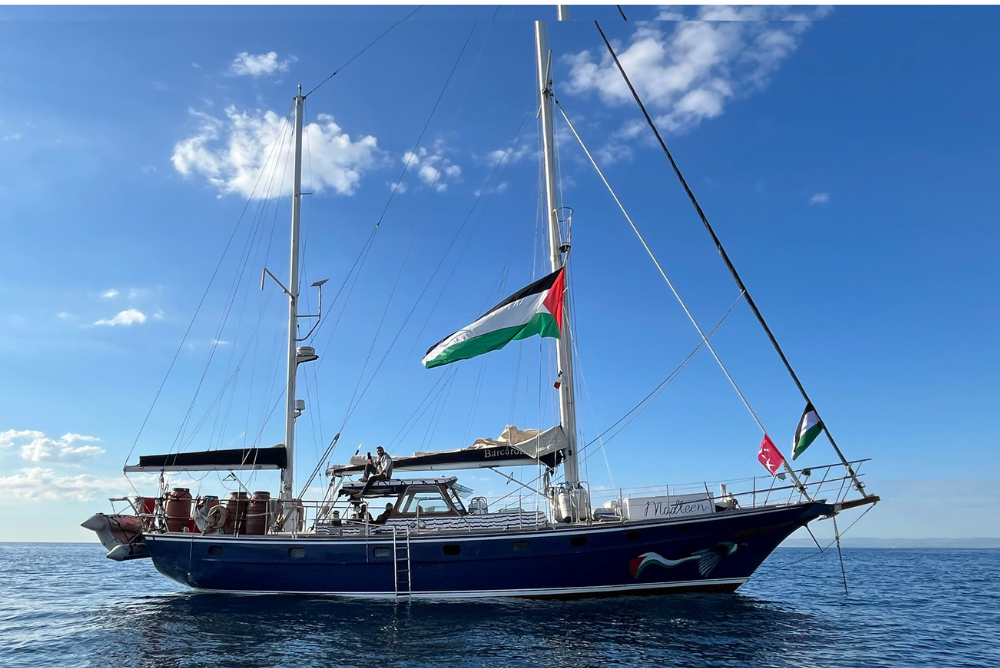Will the Global Sumud Flotilla break through Israel’s naval blockade of Gaza?

Global Sumud Flotilla challenged by Israeli navy. Image Credit: PHM
The Global Sumud Flotilla, a massive humanitarian convoy of more than 50 ships carrying activists, aid, and international delegates, is pressing toward Gaza despite escalating confrontations with Israeli naval forces.
Activists report that Israeli warships have already circled and harassed lead vessels, cutting communications and forcing evasive maneuvers. Israel has vowed to prevent the flotilla from breaching its naval blockade on Gaza, raising fears of a violent interception reminiscent of past flotilla clashes.
What Is the Global Sumud Flotilla?
The flotilla, which set sail from Spain on August 31, 2025, represents the largest maritime mission to Gaza to date. It carries more than 500 activists from 44 countries, including Italian politicians and climate campaigner Greta Thunberg, who insist the journey is a peaceful attempt to deliver humanitarian aid and challenge the blockade imposed by Israel.
The mission has already passed the 120 nautical mile mark, placing it within the same high-risk zone where previous aid flotillas were intercepted.
Israel’s Response: Threats and Preparations
Israel has repeatedly vowed not to allow the flotilla to dock in Gaza, insisting that aid must be delivered via Israeli ports for inspection. According to Israel’s public broadcaster Kan, the military is preparing to “take control” of the ships using naval commandos and warships, with some vessels potentially being sunk at sea.
Israel accuses the flotilla of serving Hamas interests, though it has not provided evidence. Activists strongly deny the claim, framing the mission as a strictly humanitarian effort protected under international law.
International Reactions and Italian Warnings
The flotilla’s journey has sparked political debate across Europe. Italian Prime Minister Giorgia Meloni urged activists to abandon their mission, warning it could undermine a US-backed peace plan aimed at halting the war between Israel and Hamas.
Italy and Spain briefly deployed naval escorts after reports of drones, explosions, and electronic jamming targeted the flotilla near Crete, an incident activists blamed on Israel. Pope Leo XIV also expressed concern for the safety of activists at sea, urging restraint and respect for humanitarian missions.
READ ALSO
Greta Thunberg’s Gaza flotilla boat struck by drone in Tunisia: What to know
Key takeaways from Trump’s plan for Israel and Hamas
Legal Debate: Does Israel Have the Right to Intercept?
Under the United Nations Convention on the Law of the Sea (UNCLOS), vessels in international waters enjoy freedom of navigation and cannot be legally intercepted. The flotilla maintains it is operating lawfully, with legal experts pointing to the San Remo Manual, Geneva Conventions, and recent UN resolutions that prohibit blockades causing starvation or preventing humanitarian relief.
Past flotillas, including the deadly Mavi Marmara raid in 2010 when Israeli commandos killed 10 activists in international waters, have drawn accusations that Israel is violating maritime law.
Why the Flotilla Matters
For activists, the mission symbolizes global solidarity with Gaza and a direct challenge to Israel’s control of humanitarian access. For Israel, it is a security risk tied to its broader campaign against Hamas.
With both sides entrenched, the Global Sumud Flotilla is becoming a flashpoint not just for the Israel-Gaza conflict, but for the broader debate over international law, humanitarian rights, and naval blockades.
FAQ
Q: What is the Global Sumud Flotilla?
A: The Global Sumud Flotilla is a humanitarian convoy of more than 50 ships carrying activists, politicians, and aid supplies to Gaza, aiming to challenge Israel’s naval blockade.
Q: Why is Israel trying to stop the Gaza flotilla?
A: Israel argues the flotilla poses a security threat and insists aid must go through Israeli ports. Activists accuse Israel of unlawfully blocking humanitarian access.
Q: Is the Gaza flotilla legal under international law?
A: Yes. According to the UN Convention on the Law of the Sea (UNCLOS), ships in international waters cannot be intercepted. Legal experts say blockading humanitarian missions violates international law.
Q: Has Israel attacked flotillas before?
A: Yes. The most infamous case was the Mavi Marmara raid in 2010, where Israeli commandos killed 10 activists in international waters. Since then, Israel has blocked or intercepted multiple Gaza flotillas.
Q: Who is on board the 2025 Gaza flotilla?
A: More than 500 activists from 44 countries, including Italian politicians and Swedish climate activist Greta Thunberg, are sailing aboard the flotilla.
Q: What did Italy and other countries say about the flotilla?
A: Italy and Spain briefly deployed naval escorts after drone attacks on the flotilla, but Prime Minister Giorgia Meloni urged activists to stop, warning it could derail US peace efforts.
Q: Could Israel legally sink flotilla ships?
A: No. Sinking or seizing non-violent humanitarian vessels in international waters is illegal under maritime law, including UNCLOS and Geneva Conventions.
Q: What humanitarian aid is the flotilla carrying?
A: It is loaded with medical supplies, food, and relief materials for civilians in Gaza, who face shortages due to the blockade.
Q: What happens if Israel intercepts the flotilla?
A: Activists may be detained and deported via Israeli ports, while the ships could be seized or destroyed. Such actions risk sparking global condemnation and legal challenges.
Q: Why does the flotilla matter for Gaza?
A: The mission highlights the humanitarian crisis and tests the international community’s willingness to defend aid access and maritime law against blockades.

